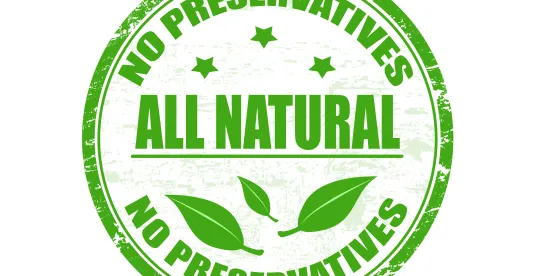Among recent trends in consumer product false advertising class actions has been the rise in cases alleging false advertising for products touting ingredients as “all natural” or “100% natural.” These lawsuits often point to any product label-language that could somehow be construed by consumers as referring to the product as “natural,” even when that is not what was intended by the manufacturer and would belie a reasonable reading of the product packaging. Recent decisions from the Second and Ninth Circuit Courts of Appeals reflect a growing recognition that reasonable consumers would not be misled by a label that could be construed as referencing that a product is “natural,” particularly when those statements are ambiguous and other portions of the product packaging clearly disclose the purportedly non-natural ingredients. These cases provide a much-needed common sense approach to adjudicating false advertising class actions challenging label marketing claims related to the naturalness of a product.
We have previously written about the Ninth Circuit’s decision in McGinity v. Procter & Gamble Co., 69 F.4th 1093 (9th Cir. 2023), where the court held that a consumer product manufacturer could rely on an ingredients list panel located on the back of the challenged product packaging to determine whether an ambiguous phrase on the front label was misleading or deceptive. Foley has also previously analyzed district court decisions in the Ninth Circuit applying McGinity.
Just last week, in Bustamante et al. v. KIND, LLC, 2024 WL 1917155 (2d Cir. May 2, 2024), the Second Circuit affirmed summary judgment for the defendant food manufacturer in a false advertising class case challenging “all natural” marketing claims. Bustamante provides a good illustration of how difficult it can be to appropriately define the label term “All Natural” as used on product packaging. In particular, the plaintiffs in Bustamante alleged that they were misled by the phrase “all natural” on the labeling of snack bar products and brought state law consumer protection statutory claims on behalf three classes comprised of California, New York, and Florida consumers who purchased the product.
After the district court certified three damages classes under Rule 23(b)(3) of the Federal Rules of Civil Procedure, defendant moved for summary judgment, arguing that plaintiffs had failed to carry their burden to present admissible evidence establishing how the challenged “All Natural” statement would mislead reasonable consumers acting reasonably. In opposition, plaintiffs pointed to several pieces of evidence to support their allegations that a reasonable consumer would interpret the phrase “All Natural” to mean that the products do not contain synthetic or artificial ingredients, including: (i) two expert reports; (ii) the named plaintiffs’ testimony; (iii) defendant’s internal documents; and (iv) the dictionary definition of the word “natural.” The district court granted defendant’s motion for summary judgment because it found that plaintiffs had failed to meet their burden in establishing a reasonable consumer’s understanding of the phrase “All Natural” to prove deception, an essential element of their claims. Plaintiffs appealed.
In affirming, the Second Circuit found that plaintiffs’ consumer perception expert evidence, which sought to establish that reasonable consumers view products with an “All Natural” descriptor as being free of artificial and synthetic ingredients, was correctly excluded because the survey on which it relied was biased and leading. Likewise, the appellate court held that the district court correctly excluded plaintiffs’ expert chemist evidence, which challenged the term “All Natural” based on the composition of the products’ ingredients, because plaintiffs’ expert neither analyzed the actual ingredients in the products nor considered how the actual product ingredients were sourced or manufactured. The court also determined that plaintiffs’ expert evidence failed to present a cohesive definition of what a reasonable consumer would expect from products labeled “All Natural.”
In addition, the Second Circuit found that the testimony of the named plaintiffs failed to demonstrate a common objective understanding of the term “All Natural” that reflected the views held by “a reasonable consumer.” Instead, the court noted that plaintiffs’ own testimony established how divergent consumers’ expectations can be as to the meaning of the phrase “All Natural.” Notably, several plaintiffs testified that consumers could have different understandings about the implications of the term “All Natural,” that these understandings could change over time, and that not everyone would agree with their understanding of that term.
The Second Circuit also determined that defendant’s internal documents, which discussed defendant’s understanding of what “All Natural” means, did not reveal a reasonable consumer’s understanding of that term. The court similarly was unpersuaded by an ordinary dictionary definition of the word “natural” — “existing in or caused by nature; not made or caused by humankind” — as sufficient for plaintiffs to meet their burden of establishing what a reasonable consumer acting reasonably expects from a product labeled “All Natural” in the context of applying it to a mass-produced snack bar wrapped in plastic.
Moreover, in an earlier district court decision issued out of the Second Circuit in the case of de Lacour et al v. Colgate-Palmolive Co., 16-CV-8364 (KMW), 2024 WL 36820, at *6 (S.D.N.Y. January 3, 2024)[1], a review of governmental guidance on the term “natural” further confirmed that “there are many interpretations of the word ‘natural’” because the governmental agencies weighing in on the term’s meaning have not reached an agreement on a definition. For instance, the court noted that the U.S. Food & Drug Administration (FDA) solicited public comments regarding use of the term “natural” on food product packaging in 2015 but never promulgated a definition after receiving over 7,000 comments reflecting varying and wide-ranging understandings of the term. Because there is no objective governmental understanding of the term “natural,” the district court found that plaintiffs in that case could not meet their burden to establish a “reasonable consumer’s understanding of ‘natural.’”
Calls for federal regulators to provide clarity on the meaning and appropriate interpretation of the term “natural” have gone unanswered, and because of this ambiguity, it has been left to the courts to assess whether naturalness-based product marketing claims are deceptive. As the above cases demonstrate, a key issue in these cases is whether “naturalness” claims are ambiguous when viewed in context, such that courts can consider statements made on other parts of the product packaging in evaluating the plaintiff’s allegations of deceptiveness. This point is particularly important in evaluating whether a claim can be successfully challenged at the motion to dismiss stage, where factual allegations must be construed in plaintiff’s favor. These recent appellate decisions from the Ninth and Second Circuits take a more thoughtful and critical approach to adjudicating allegations of false or misleading “natural” labeling.
[1] The plaintiffs in de Lacour argued they were misled by the inclusion of the term “natural” on toothpaste and deodorant products and sought to certify a class of California, New York, and Florida consumers.





 />i
/>i

